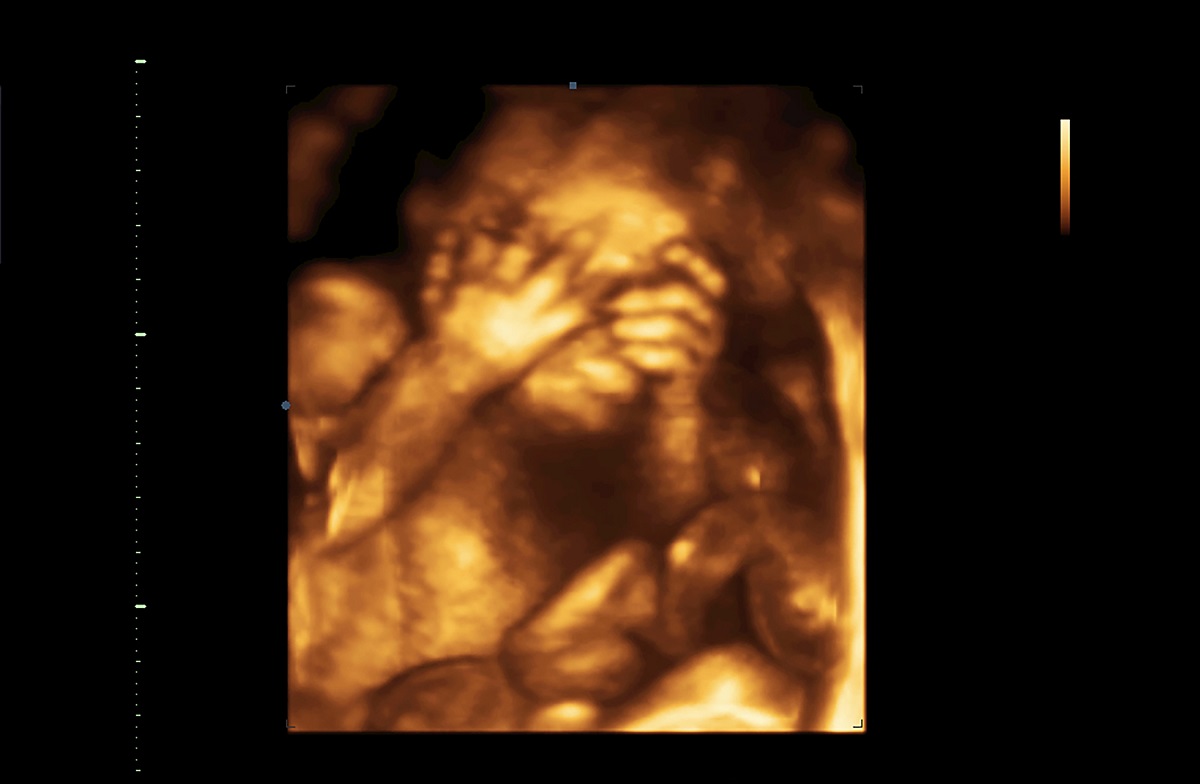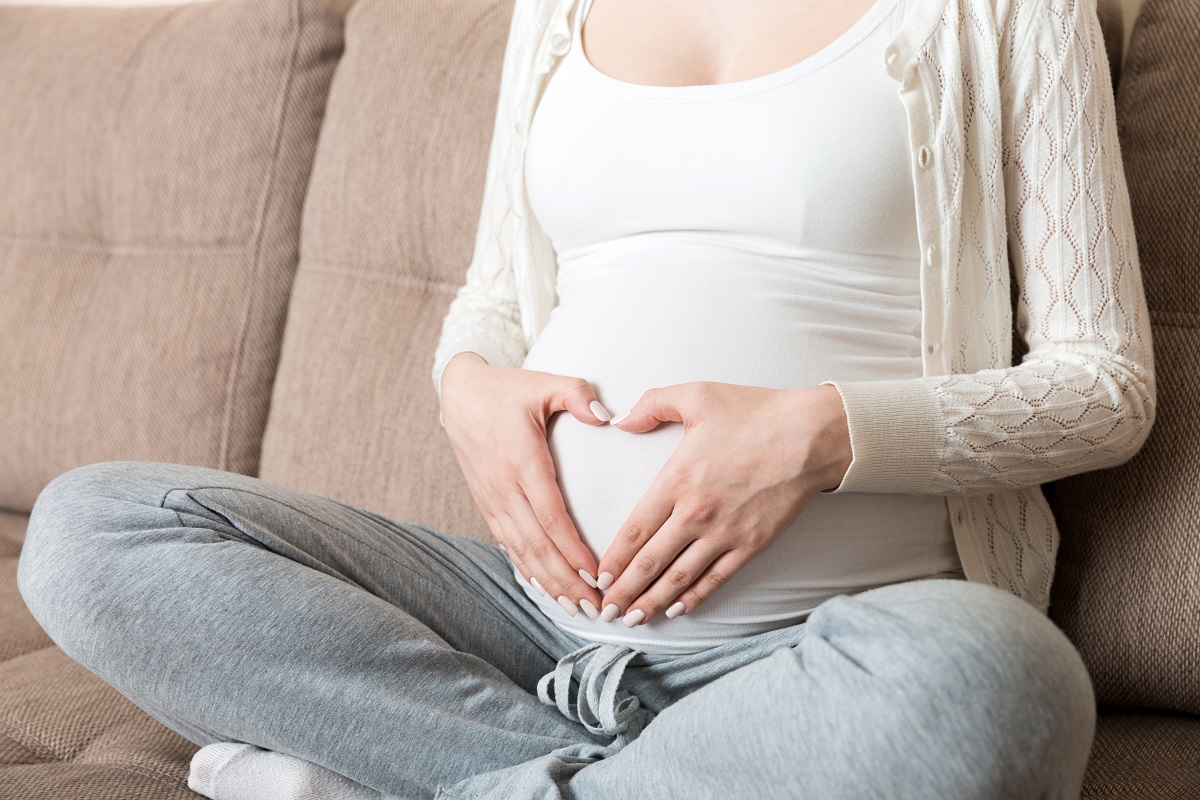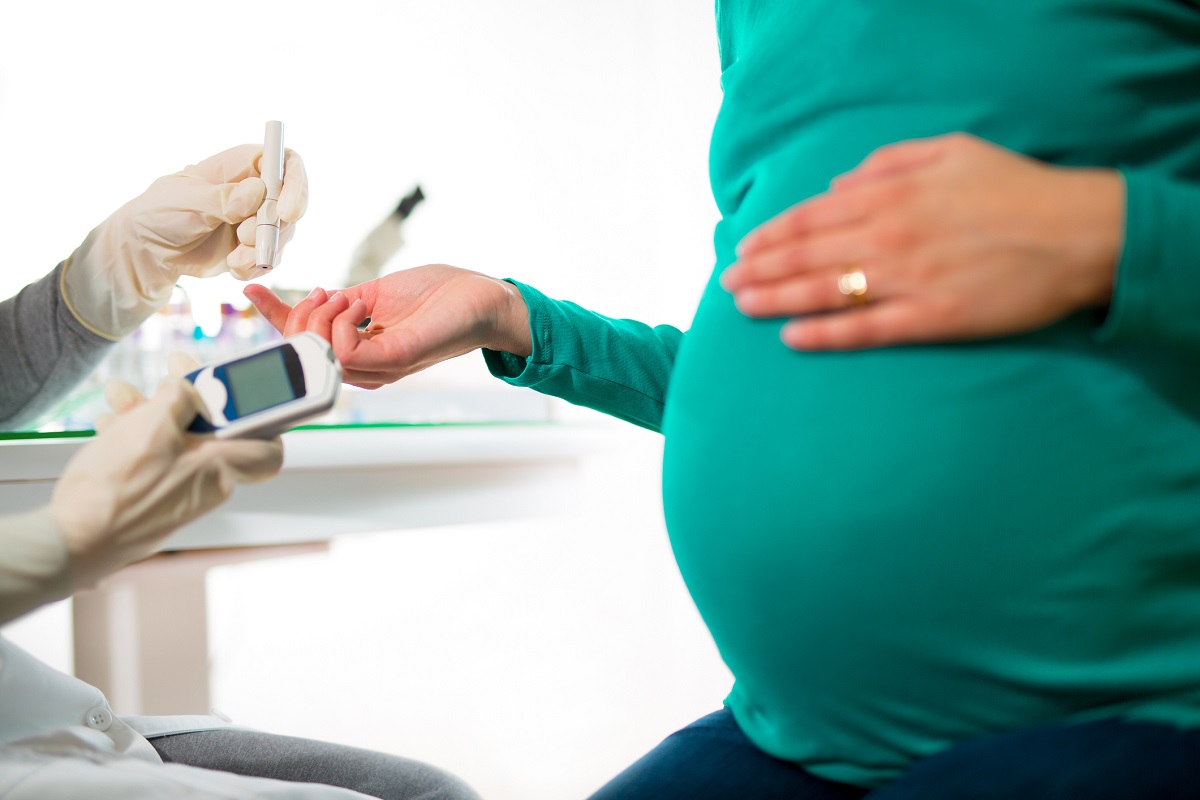- whattoexpect.com - 24th week of pregnancy
- nhs.uk - Week-by-week quide to pregnancy
- verywellfamily.com - 24th week of pregnancy
- flo.health - 24th week of pregnancy
- healthline.com - 24th week of pregnancy: symptoms, advice and more
- medicalnewstoday.com - Your pregnancy at week 24
24th week of pregnancy (24.TT): eye opening and fetal blinking?

The foetus grows and gains strength, and you feel its movements more and more. It alternates between periods of sleep and activity. It may happen that the baby stays in one position for several hours.
Article content
Your tummy is now the best the baby can get. It has everything it needs to develop and grow properly.
How is your baby developing in your tummy?
Your baby is about 30 cm long and weighs 600 grams.
There is still enough room in the womb for it to turn around.
It is already slowly looking like a newborn, only smaller and thinner, with no stored subcutaneous fat.
The table shows the approximate measurements of the fetus at 24 weeks, taken by sonography
| Total length | Weight | HC Head circumference | BPD Transverse head diameter | AC Abdominal circumference | FL Femur length |
| 30 cm | 600 g | 219.1 mm | 61.4 mm | 191,2 mm | 41,9 mm |
He is growing more every day. He is gaining muscles, bones, organs and depositing fat in his subcutaneous tissue. The fat is gradually smoothing out his wrinkled skin. This stored fat is especially important after birth when it will maintain and regulate his body temperature.

The face of the fetus takes shape, has its characteristic features and becomes more pronounced.
The eyelids closed and fused together at 11 weeks. At 23 weeks of pregnancy, they slowly began to separate. At 24 weeks, they fully separated and reopened. So now your baby is starting to look around and blink his eyes in the womb.
The eyelids are already beginning to take their final shape and the eyes are responding to light.
The skin is still red, dark pink in some places, translucent and still wrinkled to look at. The fetus is already storing fat under the skin. The skin is still translucent. But it won't be long before enough fat is stored in the subcutaneous tissue and the skin smooths out to a nice pink colour.
Sweat glands form on the skin.
The hairs, eyelashes and eyebrows are still white at this time. The pigment has not yet built up to colour them.
The muscles of the fetus are becoming softer and stronger. The baby is constantly exercising them with his movements, kicks and somersaults.
Taste buds form in the oral cavity of the tongue, which allow the baby to taste the amniotic fluid.
The lips and mouth become sensitive to touch.
Teeth also begin to develop in the oral cavity. However, the baby's first teeth do not appear until several months of life.
The fetal heart works diligently at 120 to 160 beats per minute.
Only the brain and lungs are still developing.
The fetal brain continues to develop at an incredible rate.
The lungs are almost completely finished. The formation of the branches and the production of surfactant begins. Surfactant is a substance that lines the alveoli (air sacs in the lungs) so that they don't stick together when you exhale.
Surfactant is essential for a baby's healthy breathing.
Surfactant is still a very small amount. It would make it almost impossible for a baby born this week to breathe unaided.
The liver and spleen are functional.
The inner ear, composed of the auditory apparatus and the balance organ, which controls balance, is still developing.
The baby perceives all the sounds that surround him. He perceives your heartbeat, your breathing, the movement of your lips, your voice, your partner's voice when he talks on his tummy. He even perceives piercing sounds such as the barking of a dog, music and sounds from the environment.
How does a woman feel at 24 weeks pregnant?
Your weight is increasing, even if you are not eating more than before. This is because your baby is gaining weight and growing. Your weight has probably increased by 6-7 kg since the beginning of your pregnancy if you have not overeaten and have been eating healthily.
Your tummy is getting round in shape. Its size depends on your height, body type, pre-pregnancy weight and whether this is your first pregnancy.

First-time mothers usually have smaller tummies because their abdominal muscles are firmer and have not been affected by previous pregnancies.
Hormone fluctuations during pregnancy can also cause mood changes, loosening of ligaments, joints, hair and nail growth.
Unwanted hair growth may occur due to hormones in unusual places on a woman's body, such as on the face, abdomen or around the nipples.
As in the previous weeks of pregnancy, you may be troubled by various pregnancy symptoms.
Abdominal cramps, Braxton Hicks contractions or so-called errands often appear after activity. They come at any time of the day, at irregular intervals and are not painful. You feel them as a sudden clenching of the abdomen, an uncomfortable pressure of the uterus. Your abdomen becomes hard as a stone for a while.
The pain in your lumbar spine may wake you up from sleep. Due to the pregnancy hormone, your ligaments and joints relax to better prepare your body for childbirth.
The dark line on your abdomen (linea nigra) darkens.
Your skin is more stressed, especially on the abdomen. It tends to dry out and then itch. Limit bathing and opt for a quick shower, which does not dry out the skin as much. Use moisturising creams.
Rashes can also appear on your face.
Swelling is common in pregnancy, especially swelling of the lower limbs around the nipples. You may also notice swelling of the hands, especially after you lie down for a while during the day or when you get out of bed in the morning. Swelling of the hands can cause a tingling sensation.
Try putting a pillow under your hands while you sleep. During the day, move and exercise your fingers, stretching and shaking your hands. Repetitive movements, such as typing on a computer, can make these symptoms worse. So remember to take breaks and stretch your hands.
Tingling, numbness and pain in the wrists and fingers, known as carpal tunnel syndrome, are common when the wrists are overloaded with work. Perhaps your hands are not overloaded, you are not working on a computer or overworking them. However, carpal tunnel syndrome can occur in pregnancy. It is caused by fluid retention throughout the body, especially if you suffer from swollen wrists.
If you did not suffer from this condition before pregnancy, you most likely do not have to worry about this unpleasant symptom remaining. These symptoms often disappear a few days after giving birth, when your body drains and your hormones return to normal.
Some moms-to-be have experienced red itchy palms, which are also among the symptoms of pregnancy.
Tell your doctor about these problems. It may be a rare complication of a disorder of bile production and drainage. But these symptoms are more common in the 3rd trimester. However, this sensation may not immediately indicate a disorder. It may just be the effect of hormones on your body.
If your palms itch a lot, try soaking them in cold water or making a compress. Avoid chemicals and leave the cleaning up to your partner.
Hormones can cause an unexpected metallic taste in the mouth, increased salivation.
Headaches often occur in pregnancy. If you are bothered by light, feel nauseous to vomiting, have a severe throbbing headache, it is a migraine. Try lying down in a dark cool room and relax.
Consider whether the migraine was triggered by food. Avoid migraine-inducing foods in pregnancy.
Women who have never had a migraine may experience it in pregnancy. Women who know headaches may experience them more often. The most common triggers of headaches to migraines are fatigue, stress, drop in blood sugar, tension, overheating.
Leg cramps can also wake you from sleep or flare up at any time of the day. As soon as you feel a cramp coming on in your leg, straighten your leg immediately. Try to pull your toes towards your knee. This should stop the cramp.
Constipation in pregnancy is caused by the relaxation of the intestinal muscles due to hormones. Your bowels move more slowly and absorb nutrients better. In doing so, you experience an uncomfortable feeling of fullness in your bowels.
With strong pressure to pass stool, hemorrhoids can appear , which are painful and can bleed. As a prevention of hemorrhoids, eat plenty of fiber and drink plenty of fluids.
Pain in the lower abdomen is caused by the growing uterus and stretching of the ligaments.
Blurred vision can be caused by hormones. Hormones can decrease tear production and increase fluid production in the eye, leading to vision problems.
Vaginal discharge during this period of pregnancy can cause discomfort. But it should not smell or be discolored. White to translucent vaginal discharge is normal.
Pregnancy affects a woman's entire body through hormonal changes and changes to a woman's body. For each pregnant woman, these symptoms are individual. Each week a new symptom may surprise you. Other symptoms that were described in previous weeks of pregnancy may also appear.
The most common symptoms in the 24th week of pregnancy are
- fatigue and sleep problems
- stretch marks
- indigestion and heartburn
- hot flushes
- back pain
If you notice unusual symptoms, contact your gynaecologist or visit your nearest hospital.
Do not delay seeing your gynaecologist or hospital if you develop them:
- very frequent fainting and dizziness
- severe itching
- high or too low blood pressure
- pressure on the limbs with pelvic pain or abdominal cramps
- vaginal bleeding
- regular contractions
Pregnancy counseling at 24 weeks of pregnancy
You will have a screening blood glucose test (blood sugar test or oGTT) this week. This test is done to detect gestational diabetes (gestational diabetes). Gestational diabetes is temporary and only appears during pregnancy.
Gestational diabetes is more likely to occur in women who are at increased risk of developing gestational diabetes. These are obese women, women who are overweight, women with an increased amount of fat on their abdomen, or women with a family history of diabetes.
Gestational diabetes develops between the 2nd and 3rd trimesters of pregnancy. With blood sugar imbalances, there is a risk to both the fetus and the mother.
Gestational diabetes does not mean that you are diabetic and will remain diabetic.
This type of diabetes only occurs in pregnancy and usually resolves within six months of pregnancy.
If left untreated, mothers give birth to large babies over 4 kg. In a normal delivery, there is a risk of injury to the mother or damage to the shoulders of the fetus, or getting stuck in the birth canal during delivery.
Despite the above-average size of the fetus, its organs may be underdeveloped.
Examination is carried out between 24 and 28 weeks of pregnancy and is detected by the oGTT (oral glucose tolerance test).
How does the test work?
Before the test, the woman should eat as usual for at least three days and do physical activity as usual. On the day of the test, the woman should arrive early, after at least 8 hours of fasting, without consuming caffeine or smoking.
In the morning, blood is drawn to check the woman's blood sugar. She is then given 75 g of glucose powder dissolved in 250-300 ml of tea or water to drink.
Further blood draws are taken after 60 and 120 minutes. In the meantime, the woman does not consume anything, at most she drinks plain unsweetened water or tea. During the examination she sits in the waiting room and should be at rest without physical activity.

What to watch out for?
- Eat a healthy diet, add plenty of vegetables, fruit, protein and a diet rich in calcium.
- Avoid sugary and spicy foods, which can weigh you down and cause digestive problems. Reach for easily digestible foods to ease sluggish digestion.
- A diet rich in fiber, such as oatmeal, whole grain breads, will help prevent constipation.
- Supplement prenatal vitamins to cover the daily intake of vitamins needed for the fetus.
- Follow a drinking regime, at least 2-3 litres of fluids a day.
- If you suffer from swelling, limit salting.
- If you have confirmed gestational diabetes, you must eat a complete diet low in sugars. Divide your diet into 6 portions a day. More than half of your diet should be fresh vegetables and the other half should be protein and carbohydrates in equal proportions.
- Get plenty of exercise during the day. Walking in the fresh air will help you get fit, give you energy and put you in a better mood. A longer walk in the countryside will also help you sleep better in the evening and your sleep quality will be better.
- If you don't have the opportunity to go for longer walks, exercise in the comfort of your own home. Pregnancy yoga or exercise for pregnant women is very suitable.
- You do not have to avoid sports either. Playing sports sensibly is beneficial. Pregnant women should be more careful and not do sports that can cause injury. Sports for pregnant women should not be strenuous. Swimming is an excellent choice for pregnant women.
- Practice sitting or standing Kegel exercises at any time of the day to strengthen the pelvic floor. These exercises will help prevent urine leakage in the later stages of pregnancy and help you recover faster after delivery.
- Take time to rest, stretch your legs and relax during pelvic floor exercises.
- Try to be emotionally and mentally well.
- Your tummy is already growing, so choose comfortable clothes that won't push or restrict you
- Wear comfortable shoes that will not push you even when you turn your feet.
- Your skin needs extra care, so give it some attention. After giving birth, you will recover faster and have fewer stretch marks.
- Beware of herbal teas, not all are suitable to drink in pregnancy.
- Beware of medications, consult your doctor or pharmacist.
- Avoid direct sunlight. Your skin could burn quickly. If you are in the sun, use a cream with a high SPF during the day.
- Slowly start preparing for the arrival of your baby, who will be with you in a few weeks. Make a list of things you will need for his arrival.
- Think about your antenatal preparations. Before you know it, the due date is here.
Read also other interesting articles about pregnancy:
- Ultrasound in pregnancy: fetal size, what is fetal biometry?
- What is pre-eclampsia? Is pregnancy risky?
- How to recognize pre-eclampsia and its symptoms in pregnancy? Know the risks
- Are you pregnant and suffering from lower abdominal pain?
- Itchy skin in pregnancy? What causes burning skin and what helps?
- How much weight to gain in pregnancy? What does it depend on and what to watch out for?
- Head spinning in pregnancy: at the beginning and as a symptom, what else does it mean?
Read more about the other weeks of pregnancy in the summary article.
Gallery



Interesting resources
Related










